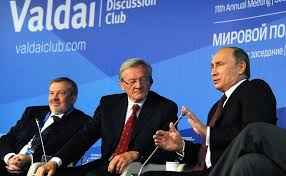The existing model of capitalism has run its course says Russian president Putin
The current model of capitalism can no longer offer a way out of the "snarl of increasingly tangled contradictions
The existing
model of capitalism has reached its limits, said Russian President Vladimir
Putin.
"Everyone
says that the existing model of capitalism, which the basis of social structure
in the overwhelming majority of countries, has run its course," the head
of state said, speaking on Thursday at a meeting of the Valdai International
Club.
Here are some important excerpts of his keynote speech.
According to him, this model can no longer offer a way out of the "snarl of increasingly tangled contradictions.Everywhere, even in the richest countries and regions, the uneven distribution of material wealth leads to aggravating inequality," the head of state added.
The socioeconomic problems facing humankind have worsened to the point where, in the past, they would trigger worldwide shocks, such as world wars or bloody social cataclysms. Everyone is saying that the current model of capitalism which underlies the social structure in the overwhelming majority of countries, has run its course and no longer offers a solution to a host of increasingly tangled differences.
Everywhere,
even in the richest countries and regions, the uneven
distribution of material wealth has exacerbated inequality, primarily,
inequality of opportunities both within individual societies
and at the international level. I mentioned this formidable
challenge in my remarks at the Davos Forum earlier this
year. No doubt, these problems threaten us with major and deep social
divisions.
Furthermore,
a number of countries and even entire regions are regularly hit
by food crises. We will probably discuss this later, but there is every
reason to believe that this crisis will become worse in the near
future and may reach extreme forms. There are also shortages of water
and electricity (we will probably cover this today as well), not
to mention poverty, high unemployment rates or lack of adequate
healthcare.
Lagging countries are fully aware of that and are losing faith in the prospects of ever catching up with the leaders. Disappointment spurs aggression and pushes people to join the ranks of extremists. People in these countries have a growing sense of unfulfilled and failed expectations and the lack of any opportunities not only for themselves, but for their children, as well.
This is what makes them look
for better lives and results in uncontrolled migration, which,
in turn, creates fertile ground for social discontent in more
prosperous countries. I do not need to explain anything to you,
since you can see everything with your own eyes and are, probably, versed
on these matters even better than I.
As I noted earlier, prosperous leading powers have other pressing social problems, challenges and risks in ample supply, and many among them are no longer interested in fighting for influence since, as they say, they already have enough on their plates.
The fact that society and young people in many countries have overreacted in a harsh and even aggressive manner to measures to combat the corona virus showed – and I want to emphasise this, I hope someone has already mentioned this before me at other venues – so, I think that this reaction showed that the pandemic was just a pretext: the causes for social irritation and frustration run much deeper.
I also
said that there were no ready-made recipes. It is true that what we are
currently witnessing, for example on the energy markets,
as we will probably discuss later, demonstrates that this kind
of capitalism does not work. All they do is talk about the “invisible
hand” of the market, only to get $1,500 or $2,000 per 1,000
cubic metres. Is this market-based approach to regulation any good?
When
everything goes well and there is stability, economic actors around
the world demand more freedom for themselves and a smaller
role for the state in the economy. However, when challenges
arise, especially at a global scale, they want the government
to interfere.
I remember 2008 and 2009 and the global financial crisis very well. I was Prime Minister at the time, and spoke to many Russian business leaders, who were viewed as successful up to that point, and everything is fine with them now, by the way.
They
came to me and were ready to give up their companies that were
worth tens of millions, if not hundreds of millions of dollars,
for a Ruble. Why? They had to assume responsibility
for their workforce and for the future of these
companies. It was easier for them just to keep what they earned
and shift their responsibility to others.
At the time, we agreed that the state would lend them its shoulder: they kept their businesses, while the state paid off their margin loans and assumed responsibility, to a certain extent. Together with the businesses, we found a solution.
As a result, we saved Russia’s
largest private companies, and enabled the state to make
a profit afterwards. We actually made money because when
the companies were back on their feet, they paid back what they owed
the state. The state made quite a profit.
In this
regard, we do need to work together and explore each other’s
experience. Other countries also had positive experiences in making
the state and the market work in tune with each other.
The People’s Republic of China is a case in point. While
the Communist Party retains its leading role there, the country has
a viable market and its institutions are quite effective. This is
an obvious fact.
In a way,
this is like art. You need to understand when to place a bigger
emphasis on something: when to add more salt, and when
to use more sugar. You see? While being guided by the general
principles as articulated by international financial institutions
such as the IMF, the OECD, etc., we need to understand
where we are. To act, we need to understand how our capabilities
compare with the plans we have. By the way, here in Russia
we have been
quite effective over the past years, including in overcoming
the consequences of the epidemic. Other countries also performed
quite well, as we can see.
You see, we
need to build a social welfare state. Truth be said, Europe, especially
the Nordic countries, have been advocating a social welfare state
for a long time. This is essential for us, considering
the income gap between various social groups, even if this problem exists
in all the leading economies of the world. Just look
at the United States and Europe, although the income gap is
smaller in Europe compared to the United States.
As I have
said on multiple occasions, only a small group of people who
were already rich to begin with benefited from the preferences that
became available over the past years. Their wealth increased exponentially
compared to the middle class and the poor. This problem
clearly exists there, even if it is not as pressing in Europe, but it
still exists.














Post a Comment